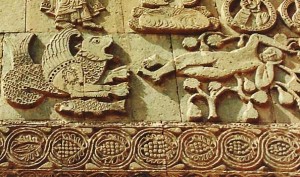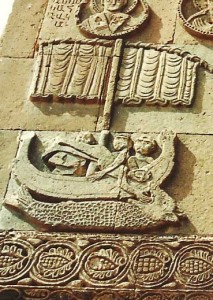These wall carvings on an Armenian church in eastern Turkey hint at a Biblical legacy that is obscured from most of us. Theological scholars are increasingly familiar with the Apocrypha, those books that were excluded from the mainstream Bible by the deliberations of generations of authorities. Less well known are the contents of scrolls discovered in caves in Qumran and elsewhere in the occupied West Bank. These were legal documents, records of mercantile activity and above all, transcriptions of the word of the Lord. The contents of these manuscripts were well-known in Biblical times but the processes of selection, translation and censorship that have led to modern texts of the Bible have resulted in passages that were unacceptable to the prevailing morality being expunged from the canon.
Western church leaders have considered it wise to disregard or conceal the existence of some of the documentation that was, in ancient times, accepted as scripture. The King James Version of the Bible rather coyly presents the final verse of Chapter 1 of the book of Jonah as ‘and Jonah was in the belly of the fish three days and three nights.’ He was indeed, but not in the way that children’s picture books of the Bible portray the incident.
In the first panel, we see a seraph whom God has seen fit to prepare for a marine assignment. The seraph admonishes Jonah, who lies naked on the ground, in a pose of post-coital euphoria. His sexual partner or, from the evidence of this relief carving, his victim, is now under the protection of the seraph. Its injuries are clear evidence of Jonah’s sexual misdeeds.
In the second millennium BC, having sex with fish was a reasonably common way of circumventing the many religious restrictions on sexual activity. Biblical rules regarding what one could and couldn’t penetrate were outlined in chapter 20 of Leviticus in which it is fairly clear that a ‘if a man lie with a beast, he shall surely be put to death: and ye shall slay the beast’ (Verse 16; this injunction is also made clear in Exodus 22). Further clarification is provided in verse 25: ye shall not make your souls abominable by beast, or by fowl, or by any manner of living thing that creepeth on the ground, which I have separated from you as unclean. Fish, it seems, were acceptable vessels for one’s seed. However, causing injury to any of God’s creations through sexual misdeeds was not calculated to arouse the mercy of the Lord.
The second panel illustrates God’s payment-in-kind form of punishment. Jonah was ordered by God to carry out some missionary work in Nineveh to atone for his rather lackadaisical attitude toward spiritual purity. Jonah instead purchased passage on a boat going in the other direction. God caused a tempest to spring up and commanded the crew of the boat to hurl Jonah overboard. Here he has strategically placed his scaly instrument of retribution, mouth agape, to receive the now-pitiful malefactor.
It is refreshing for Biblical scholars from the western tradition to unearth such singular interpretations of the word of the Lord. The fact that representations such as this have remained untainted by the centuries of purification that scripture has undergone in order to present is as acceptable to its genteel consumers may mean that this is much closer to the original meaning of the truth vouchsafed by God to man.

Categories: Uncategorized | No Comments »


